This post is part of James Bond January, being organised by the wonderful Paragraph Films. I will have reviews of all twenty-two official Bond films going on-line over the next month, and a treat or two every once in a while.
GoldenEye saved James Bond. Bond had wallowed in obscurity for six years by the time that Pierce Brosnan’s first appearance in the role was released. As a kid, James Bond was something that was dead to me. Sure, it came on television from time to time (mostly on holidays) and they filled up a shelf at the videostore, but I always felt like they were something that had happened in the past – like the original Star Wars movies, or any Star Trek films featuring Captain Kirk. Even though I lacked the sophistication to articulate it at the time, I think I felt that the entire James Bond franchise would be reruns for me. There was nothing new happening.
And then GoldenEye was released.
And it meant business.
That opening sequence is imprinted on my memory. I have to concede that I only caught the film on video (as it was 15’s, and I wouldn’t get to sneak into the cinema), so it wasn’t the first Bond I saw on the big screen. However, I remember each of those beats. A man, running. His breath heavy. He reaches the edge of the large dam. There’s nothing there. He stretches out his arms. And he jumps, like a man who doesn’t know fear or death – or perhaps knows them so well that they are almost old friends.
Infiltrating the secret compound, it felt familiar. There were all the usual witticism (“forgot to knock”) and the suave skill. There was something else to. It introduced to 006 in the same sequence, we didn’t know him – but Bond did. “Ready to save the world again?” Alec asks Bond, as if the years between then and now had not changed a thin. But they had. A moment of indecision, an ambush – a cold gun against his friend’s head, and an instruction to surrender. I know Bond, I’ve spent enough time with him – he’ll find a way out this. He’ll have a gadget or a gizmo on hand. Hell, he could probably take out the Russian with a quick headshot. But he doesn’t. His friend, Alec, is executed by the Russians. Bond let him down – he failed. I didn’t know Bond could do that.
Bond himself barely manages to escape. He performs a death-defying leap on to a moving plane and then pulls up. He narrowly misses the mountains as the facility explodes behind him. Bond has accomplished his mission – and yet he has failed. His friend and colleague is gone. Two men went in, and only one came out. This never would have happened before. Has Bond changed? Or has the world changed around him?
And then the music starts. GoldenEye is perhaps my favourite Bond theme and my favourite introductory sequence. Written by Bono and the Edge, it seems like a conscious reference to the old Sean Connery themes. Sure, there’s a hint of synth to be heard in the background, but it sounds grand and graceful, moving with poise and dignity. Tina Turner gives the vocal performance of her life, calling to mind Tom Jones and Shirley Bassey – all the best artists who have come before her.
Perhaps more than any other part of the film, the animated sequence provides us with a backdrop to Bond’s latest adventure. In Die Another Day, the attempt to use the sequence to provide the audience with exposition of plot simply didn’t work – it felt awkward and heavy-handed. Here, we see a slew of beautiful models literally dismantling the Soviet Union, using the hammer to smash away at various icons as Bond himself chases women across the sickle. It’s clear to the audience that this isn’t just the collapse of a world power – it’s the end to the order and struggled framework which Bond himself had taken for granted.
“I think you’re a sexist, misogynist dinosaur,” the new M, a woman, accuses Bond at one point. “A relic of the Cold War, whose boyish charms, though wasted on me, obviously appealed to that young woman I sent out to evaluate you.” The movie is pretty much about how Bond refuses to movie into the twenty-first century and is still living in a glorified version of the sixties. When Bond meets his CIA contact in Moscow, he greets him with the first half of the agreed code phrase, “In London, April is a Spring month…” – however, Jack Wade is somewhat less than impressed. “One of these days,” he remarks of Bond’s practiced sophistication, “you guys are just going to learn to drop it.”
Vladimir, an old adversary from the KGB, is surprised to find Bond is still working in the public sector. After the Cold War, the real enterprise is in the private sphere. “Are you still working with MI6,” he mockingly asks Bond, “or have you joined the twenty-first century?” This isn’t a world where ideological conflicts define our existence – the terrorist atrocities in 2001 were half a decade away – but a world where old dogs like Bond find themselves unable to adapt or change. M, Bond’s oldest friend and staunch supporter, is replaced with “the evil queen of numbers.”
I have to admit, I always found it a bit disingenuous to describe Bond as a Cold War relic. The Russians only appeared in a handful of films, and – even then – were more friendly competitors (like in For Your Eyes Only) or third parties (as in From Russia With Love) rather than direct antagonists. The Living Daylights acknowledged how ridiculous direct aggression would be, resulting in a conflict nobody wanted – the series was coming to accept détente. Bond’s foes were traditionally meglomaniacs or capitalists gone mad, to be honest. There was no reason for Bond to feel outdated – the villain’s plot here (involving a killer satellite) could just as easily have been a Roger Moore or a Sean Connery film.
However, the point stands that the series was at the risk of getting trapped in the past – in nostalgia. If not for the evil schemes, then for Bond himself. His attitudes towards women, for example, were in dire need of revision – as perhaps, was the rather whimsical outlook of the series. The stakes never seemed particularly high, nor particularly organic. There was little suspense to be wrangled from the countless fights, and the series needed to evolve in order to survive. The overhaul with GoldenEye is certainly a lot less apparent than with, say, Casino Royale, but I’d argue it’s more fundamental.
For the first time, it seems that Bond isn’t the object that Moneypenny lives or dies for. When he remarks that she looks fabulous, and wonders if she was on assignment, she rebukes him. “I know you’ll find this crushing, 007,” he replies, “but I don’t sit at home every night praying for some international incident so I can run down here all dressed up to impress James Bond.” Sure, there’s the usual flirting, but Moneypenny is aware that the rules have changed. “You know, this sort of behaviour could qualify as sexual harassment,” she warns him. He jokes, but he clearly knows there’s a line – there’s no patronising bum-pat here.
The movie is more shrewdly aware of Bond as character than most of the series has been. I appreciated the depth that Dalton brought to the role and the implicit exploration of Bond’s flaws in Licence to Kill, but here a lot is made explicit. When Bond makes one of his trademark cutting remarks to the mastermind behind the attacks, he receives a very precise personal criticism in return. “I might as well ask you,” the villain replies, “if all those vodka martinis ever silence the screams of all the men you’ve killed… or if you find forgiveness in the arms of all those willing women for all the dead ones you failed to protect.” Bond feels like a fully formed character, far from the eyebrow-raising parody presented by Roger Moore.
“How can you be so cold?” the movie’s Bond girl, Natalya, asks him at one point. “It’s what keeps me alive,” he answers honestly. Of course, the movie doesn’t seem to want to dwell too much on it, as Bond has little time for pop psychology. “Here we are having a pleasant drive in the country,” he remarks to one lady, “and you’ve got to bring psychology into it.” Still, it’s nice that the movie made the effort.
Brosnan is Bond. He’s my personal second favourite Bond, behind Connery himself. Like Dalton, he wasn’t always best served by his films (his second two films are more than a little disappointing), but he managed to bring a wonderful complexity to the role. He never seemed like he was taking it entirely too seriously (check out the fun he’s having driving that tank), but he always had an edge to him. You got the sense that this Bond was a remorseless killer – he just hid it behind a nice smile. You get the sense that he really doesn’t want to start getting violent, because he just won’t be able to stop. More than any other actor in the role, Brosnan was a stone-cold killer – he executes three of his primary villains in cold blood, rather than the heat of the moment.
The movie consciously harks back to classic Connery Bond. Although it’s rather fascinated with deconstructing the Bond mythos – portraying the character as a man out of time, reduced to stalking women around Monte Carlo in times of peace – it does play several of the classic Bond tropes straight. The scene where Bond flirts with Xenia while racing his Aston Martin seems like it could have come from an early film, as does the scene where the pair trade innuendos across a casino table.
At the same time, while the movie accepts Bond must change, it doesn’t want to change him too much. Part of what modern film viewers may find dated about Bond is the straight-forwardness: he has an old-world charm about him, and appeals to a classic sensibility. They literally don’t make ’em like that anymore. “All the heroes I know are dead,” Natalya remarks at one point, urging Bond to compromise. However, that’s precisely the reason he can’t – he’s an old-school hero, for better or worse, and to lose that would be a tragedy.
Bond is lost in the present peace. “You’ve been to Russia?” Xenia asks him at one point, impressed by his knowledge. “Not lately,” he replies – almost as if he misses the fighting and action. However, once the plot kicks into gear, Bond is in his element. Seriously, the stuntwork is impressive and the action sequences are superb. Who can forget the famous chase through the streets of St. Petersberg as Bond pursues a rogue Russian General in a tank. The movie seems to suggest that Bond might be outdated if you look at him out of context, but – point him at a crisis – he’s still a man you can rely on.
Note: I’m about to discuss to the villains of the film. I normally aren’t too bothered with spoilers since – you, know – Bond killing the bad guy and riding off into the sunset is a bit of a given, but GoldenEye is so smartly constructed that it really be a shame to spoil if you haven’t seen it. Or any of the trailers for it. Because they spoil everything.
What defines Bond, as opposed to his enemies, is that Bond can make the adjustments to live in the present. The villains of the film are fixated on the past. Russian General Ourumov aspires to be “the next Iron Man of Russia”, even though that isn’t really possible anymore. However, he still hopes that he can change the world to suit his perspective, rather than changing his perspective to reflect the world.
When the real villain, Bond’s old friend Alec, is revealed as the mastermind, it’s a powerful moment. Alec is a ghost of Bond’s past, a phantom and a spectre that he can’t escape. Whereas Bond lives in the present, embracing the “now” so he can forget about the casualties along the way, Alec is stuck in the past. When Bond warns Ourumov that he’s working for a Cossack, Alec dismisses the label – “it’s in the past!” – and yet he himself is fixated on the atrocity. He conspires to send Britain back to “the Stone Age” – if he can’t escape his own past, everyone will be trapped in their own as well.
Travelyn is perhaps my favourite Bond villain. Part of it is Sean Bean’s performance – the man could be Bond – but a lot of it is just how clever it is to pit Bond against an antagonist who knows him. Sure, you might argue that spying is much more civilised when strangers do it to one another, but Alec’s ties to Bond give the movie a wonderful resonance. You forget that there’s a generic countdown and orbital weapon involved – it’s more like a war between two brothers. There’s almost something Shakespearean about that.
For my money, GoldenEye has one of the best Bond casts ever assembled. Judi Dench joins the cast as M and offers (in my opinion) the best take on the role. Famke Janssen makes one of the best “gimmick” henchmen ever to appear in a Bond movie (and Xenia as a character is a wonderful creation – eros and thanos combined in one sick and twisted package, an embodiment of Bond’s more carnal desires). Alan Cumming is great in a small supporting role as Boris. Robbi Coltrane makes a wonderful small appearance (as does Minnie Driver). Director Martin Campbell re-teams with Joe Don Baker (from Edge of Darkness) as Jack Wade, the rare example of a comic relief character who actually works in a Bond film.
GoldenEye might be the best the Bond film made. It just might be. It’s a perfect updating of the mythos, proving that the series could still appeal to modern audiences with losing a lot of itself. It didn’t have to make the same harsh trade-offs that Casino Royale did. Instead, the movie proved that you could do complexity within the framework of a Bond film, while providing audiences with all the action and wit they had come to expect.
We’ve got full reviews of all of Pierce Brosnan’s Bond films, if you want to check ‘em out:
The following bloggers have reviews of the film as part of James Bond January:
Filed under: Non-Review Reviews | Tagged: 006, alan cumming, alec travelyn, bond, Cold War, famke janssen, films, GoldenEye, jack wade, james bond, james bond january, joe don baker, martin campbell, Movies, non-review review, pierce brosnan, revenge, review, sean bean, sean connery, Soviet Union, Tina Turner, Wii, xenia onatopp |
















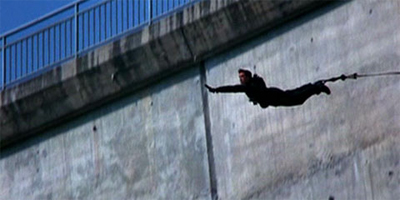
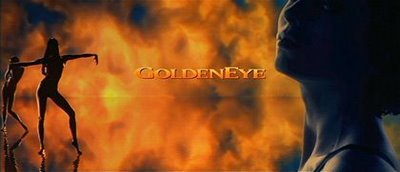
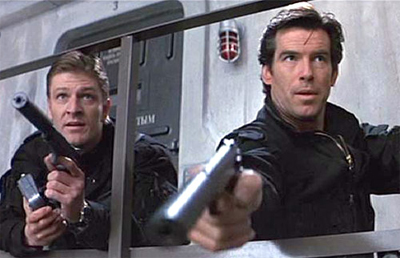
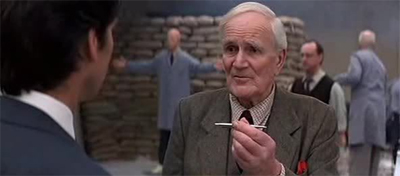
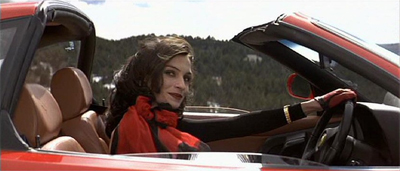
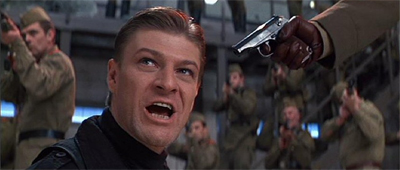
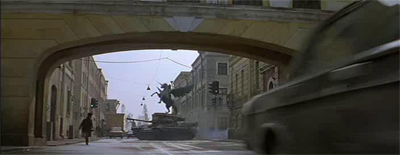
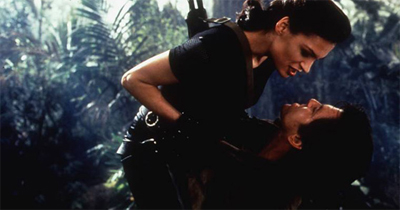
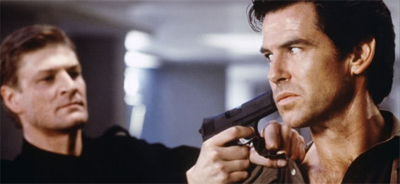
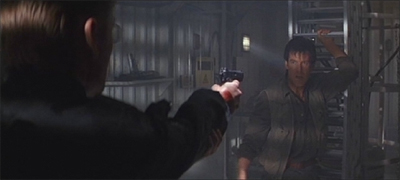





For England, James.. what a terrific film this is. bungee jump, tank chase, sauna fight… get in
Yep. Even if you aren’t interested in the “we’re rebuilding Bond” bit, it’s just fantastic sequence – fantastic sequence – Famke Janssen being sexy – fantastic sequence – fantastic sequence – Sean Bean is awesome – fantastic scene – ending.
Tina and Bono did a great job with the title track, for sure. “Goldeneye” was the film that made me a Bond fan. Its pacing is absolutely spot on.
Yep, it just flies by. It means business, which is quite something considering how bloated some of the Moore movies could seem.
Really great critique Darren, I agree with many of your positive comments regarding the movie. Goldeneye remains one of my favourites and I agree that it may well be the best Bond. I think purists will likely disagree but if this isn’t then I’d stump for The Spy Who Loved Me or Live and Let Die (as I’m a Moore fan).
Like you say, I think the film works so well because it has enough of the traditionla elements that made the early films so great (and characterised Bond) while adding enough of a modern, up-to-date edge to make it work perfectly for new audiences.
Yep. It functions seamlessly as a perfect introduction for new viewers and reintroduction for old viewers worried Bond might be out of touch. And, on top of that, it’s just fantastic.
I loved (loved, loved) the first hour and half of The Spy Who Loved Me, but I thought it kinda came apart in the end. It was so smart and witty and playing to Moore’s strengths – and there’s a giant underwater city with about three or four climaxes trapped inside.
…of course the N64 game was the best video game ever! That helps my liking towards the film. 🙂
Love the game, but I preferred Perfect Dark – the follow-up from Rare. Rare were great videogame makers. I don’t think I’ve really played too much since they left Nintendo.
I still remember reading the article I read about GoldenEye being in production. I was in grade school at the time, never heard of Sean Bean (or “Been” as I pronounced it), but back then, an evil counterpart to the hero was still a novelty. Predictable, but still novel!
Izabella Scorupco gets lost in the shuffle. So does Gottfried John (starting to age here, but still formidable). It’s interesting how those two characters keeps GoldenEye rooted in Daltonland, while Cumming and Baker are wacky Brosnan types…
That’s actually a very good point. I could see Dalton doing a version of GoldenEye, but not any of the other Brosnan films. (TWINE is probably closest, but sexual chemistry was never Dalton’s strength as Bond.)
“never heard of Sean Bean (or “Been” as I pronounced it)”
Er, aren’t “bean” and “been” pronounced exactly the same?
Also the film is great, the score is dire. Why didn’t David Arnold arrive one movie earlier?
I know I’m in the minority. but I don’t like this film very much. One reason is beside the bungee jump, I don’t like much of the action. The tank chase is just boring in my opinion because Bond is pretty muchinvulnerable in the tank. Xenia Onatopp, I know she is very popular, but I always found her a repulsively sexist character, and yes I know Bond films have always had a checkered history when it comes to gender politics. Still the idea of a woman crushing men with thighs is just disgusting, and has all sorts of awkward implications.
I also admit I never liked Piers Brosnan very much, as I always thought he was rather stiff and was too busy trying to a composite Bond, rather than his own unique creation.
I do like Sean Bean as the villain though, but then I like Sean Bean in pretty much anything.